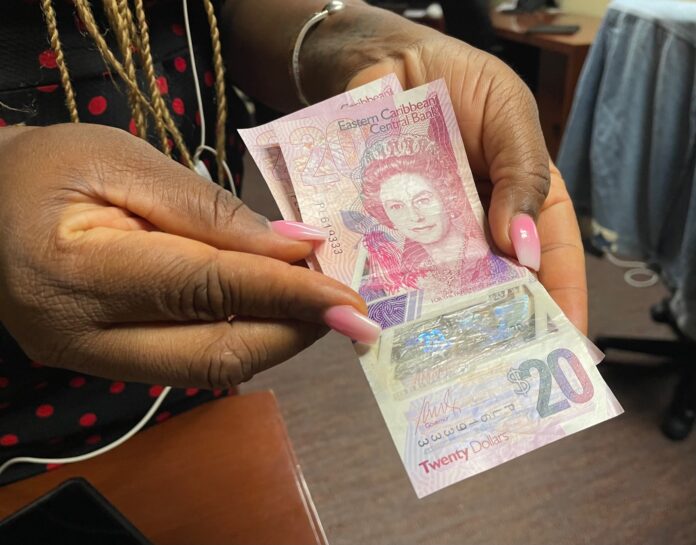By Carlena Knight
The country’s minimum wage looks set to increase for the first time since 2015.
The current minimum wage stands at EC$8.20 but Cabinet yesterday announced its decision to raise it by 80 cents after “vigorous and lengthy debates” were held during its meeting on Wednesday when the Minimum Wage Advisory Committee submitted proposals.
The proposals were to move the rate to either EC$8.90 or EC$10 per hour but a decision was taken to set it at EC$9.
“The change in the minimum wage level does not affect many of the workers in the system. We are really speaking about those workers who are not represented by unions; they do not have any collective bargaining strength, and so the floor has been moved upwards to ensure that the cost of living increases that we would have seen that they are at least able to maintain parity,” Information Minister Melford Nicholas said on Thursday during the post-Cabinet press briefing.
While some have welcomed the news, others have criticised the “minor” increase saying “that it should have been raised to $10 and up”.
“Try $15 – prices are going up and it is getting harder to survive in this country; $9 is literal scrapings! They can do better than that, especially since they made sure to sort themselves out when they thought they deserve a pay increase and a drastic one at that!” one person posted online.
But, according to Minister Nicholas, EC$9 was the most appropriate rate based on a number of factors.
He said a balance had to be struck to help stave off further inflation rises.
“To move the figure too far along could have an inflationary impact and could itself affect the ability of businesses to continue to provide employment, so there had to be some balance in relation to that,” Nicholas explained.
A similar comment was made by Chamber of Commerce President Yves Ephraim.
“People tend to look at the minimum wage from the perspective of the employees. You can’t rule out the fact that businesses are feeling that, and in the case where people are in a state of recovery from Covid and all of the shocks that the economy has received and other increases that are going on, you have to be careful that you don’t kill the goose that lays the golden egg.
“If there is no business, there is no economy,” he told Observer.
“So, if you are not sensitive to the fact that an increase like that could cause businesses to have to lay off individuals, you would have nullified any effort you would have made to try and help those who are at minimum wage, because what you would have done is put businesses in the space where they will have to make a difficult decision about shedding people because the payroll cost is too high.
“In any decision like this you are seeking to hold a balance and the business sector may be able to manage that,” Ephraim said.
Nicholas went on to say that although it may seem like a minute increase per hour, when calculated over a month it amounts to a “significant increase”.
But he also noted that the change would not mean “everyone will be restricted or regulated to that” rate.
“Employers and employees – provided that the enterprise can support paying higher wages – are certainly permitted to do that and the laws and regulations in the country affecting labour management does allow for bargaining above that, but we are saying that in any circumstance the wages should not be lower than that particular floor that we have now raised,” he added.
How significant the increase will be is debatable.
Someone working a 40-hour week on the increased minimum wage would earn EC$360 a week, which amounts to around EC$322 after statutory deductions. That equates to a take-home salary of around EC$1,288 per month.
Meanwhile, rising grocery prices threaten to absorb the little extra the increased rate will offer.
To break this down further, a box of a dozen eggs – a staple food for many – is currently priced at around EC$14, which would take a minimum wage worker more than an hour and a half to earn. A gallon of gas is also substantially higher at EC$15.54 than the EC$12.50 price at the start of the year.
When asked about the impact the salary increase will have on government’s ability to pay workers, Nicholas answered “that it is an ongoing challenge that Cabinet is working its way through”.
In previous years, Prime Minister Gaston Browne’s budget statements have had to deal with the ever-growing public sector which currently has 13,000 workers.
He said that with the addition of the Barbuda Land Registry, the reopening of a portion of the Jolly Beach Resort and the renovations of Halcyon Cove, taxes derived will mean added revenue to help pay public sector staff.
“We got to ensure that at all material times we can find the means to maintain them. The way we deal with these matters is that we grow the economy and when it grows the government’s revenues increases as well, and so that is where we will be able to get the funding from.
“We are looking at the ongoing developments in Barbuda. We believe in the next business cycle or two, there will be new taxable streams that will come from the developments taking place,” Nicholas added.
The new minimum wage looks set to take effect on New Year’s Day with the proposed EC$9 rate to be taken to Parliament where it will be debated before becoming law.
A commitment was also made by Cabinet to review the minimum wage biannually.

